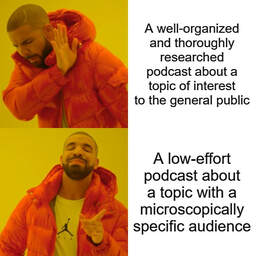 When we first started this podcast, we knew we were making something special. Something for a niche community: Latina moms, from a certain generation, who also happen to listen to podcasts. Along the way though, we’ve realized that while we are creating a product for a niche community, it can be consumed by everyone because no matter who you are, or where you come from, the truth is that motherhood and the topics related to it, are universal. Plus, you know what else is universal? Laughter and friendship. And if you’ve listened to our podcast at all, you know that these two things are at the core. Alex and I make a pretty good team. We have danced together, played together and now embarked on learning an entirely new industry, and all of the skills that go with it together. It has been an exhausting and at once exciting endeavor. Exhausting because learning to do something new always is. Exciting because the response, while not representing an exorbitant number, has been a wave of love and positivity, which in the end is the greater sum. We laugh a lot and since we did not set out to create comedy, in fact, we intended well researched, informative and fun, we had no idea that the most repeated comment would be that listeners laugh along with us. The laughter and the shared experience of momming while Latina has resonated with our very special niche community and we are so thankful. You know how they say you learn to be a mom with your first born child? Well, we learned to be mom podcasters with Season 1. And you know how they say by the second child you get it right? Well, same. See you for Season 2! Launch date to be announced. And as always, would love to hear from you! XO, Wendy
0 Comments
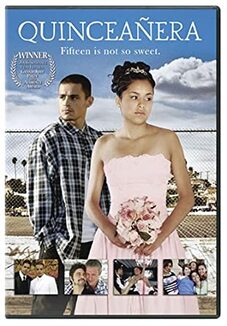 The allure of a quinceañera for teenage girls is the stuff, the attention and the feeling of collective adoration from their family and friends. Is it an outdated tradition with misogynistic roots? Yes, completely. Will it ever go out of style? No, I don’t think so. The quinceañera is not just a party or a debut into society for a young lady of marriageable age. It is an industry with lots of stakeholders comparable to the wedding industry. Because let’s be honest here, a quinceañera and a wedding have way more similarities than differences. And just like weddings, quinceañeras are here to stay. People love a party and a quinceañera is a party on crack. There is church, a procession, pageantry, synchronized dancing, and of course, glamour and drama. It is the stuff that literally movies, documentaries, and TV shows are made of and have been made of. For this week’s podcast we interview Jesse Garcia, the star of Quinceañera, the movie from 2006. This movie was released when I was working as a choreographer for a company called Sueños de Quinceañera. I did not have a quince. I had never even been to a quince before starting to choreograph for them. This job, this movie, and all of the subsequent shows like My Super Sweet Sixteen on MTV, were my indoctrination into an a segment of Latino teen life that I had not been aware of. We talked with Jesse a little bit about quinceañeras, but mostly we talked about the movie. Enjoy! Did you have a quinceañera? Will your daughter(s) have one? Would love to hear from you! XO, Wendy 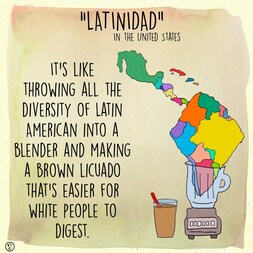 Alex and I both have bicultural children. We are always trying to figure out how to instill in them the cultural traditions and cultural identity that we grew up with. It’s hard. Our kids are growing up in a different world. One in which we have to re-educate ourselves regarding terms like Latinidad. I like the word Latinidad because to me it sounds very similar to La Unidad, unity. But apparently I am totally wrong about this because as I’ve researched this term and have learned about how it has been used, I have come to realize that it is just another umbrella term that does not quiet encompass the diversity that exists in the Latin American diaspora. This umbrella term just assumes that we are the same type of demographic and this could not be further from the truth. Politicians, marketers, content creators want to speak to us and appeal to us because we are a fast growing population who will soon be approaching our peak earning years. Having a term like Latino, makes it easy for them, the people in power, the patriarchy, however you want to call it, to put a very diverse population into a very neat little box. The real question here is: is it easier on us to be or become Latinos in the US or is it just another confusing term of identity we have to adapt to and learn to be a part of? Honestly it’s both easier and confusing. It is easy in the sense that I can just say that I am Latina and most people know what I am talking about, and what that kind of sort of means. Latino/a/x provides a point of reference mainstream America understands. It is more confusing though because it is added layer of identity. I have to be from my country of origin. I have to be American. I also have to be this hybrid Latino in the US that is a little bit of this and a little bit of that, depending on where in the US I reside. If it is confusing for me, imagine how it is for my kids who happen to also be bicultural. This is my challenge as a mom. How will I teach my children about all of the spaces that they inhabit? How do you explain Latinidad to your kids? Is this a term you identify with? Would love to hear from you! XO, Wendy 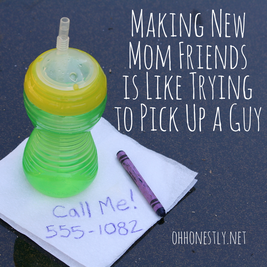 One of the hardest things I’ve ever had to do was make mom friends. I am being very deliberate about not just saying friends, because a mom friend is very specific. A mom friend is someone you can go through motherhood with. A mom friend is an ally, a confidant, an ear, and a fellow soldier in the trenches. I was one of the first to have a baby in my friend circle. I knew nothing about babies, or baby things. Out of sheer luck, a childhood friend, who had already had a baby, moved back to our hometown, where I still lived, and she walked me through what it felt like to be a mother. She drove me to the big box baby store and showed me all of the things that I would need. She helped me to understand the vast transition that I was about to go through. And even with her being so kind, generous of her time and thorough, I still was not prepared for what motherhood would feel like to me. Not gonna lie, this transition was rough. My son came into the world via emergency c-section, he was 2 weeks old when we move to another county, my husband started a new job, my parents moved in with us, being a first time mom was not what I was expecting and I for sure had postpartum depression. We went through a huge upheaval in our lives. I was suddenly in a new place, living another life and had no friends. I don’t know how I managed to do this, but I gave myself a mission: to find mom friends. I joined every mom group I could find nearby. I went to every parent and child class that I could attend. I saw other moms, saw how they interacted with their babies, and I talked and asked a ton of questions. These groups helped me become more comfortable in my role as a mother, helped me feel more comfortable in my new community, helped our new multigenerational family become better acclimated. These groups were a blessing. And while I did not make the type of mom friends that I was looking for at that time, you know, the fellow Mamacitas that would day drink with me at the park while we shit talked about the crazy things our kids did, the groups were a wonderful resource. My son is almost 6 and I have a second child now. My close friends did eventually start having kids and I did eventually find a mom friend group in my new community. My world has grown immensely. And while I have always said that I am not good at making new friends, I proved to myself during one of the hardest times in my life, that I can. That I could. That I did. What was your experience making mom friends? Do you think having mom friends is important? What do you think the benefits of having a mom friend group have been for you? Would love to hear from you! XO, Wendy  In the 1990’s there was what the media dubbed the Latin explosion, referencing pop artists such as Ricky Martin, J-Lo and Marc Anthony who were successfully doing cross over albums. I remember my teenage self thinking finally, we (Latinos) have arrived. But as it happens with most trends, the idea of the Latin explosion was fleeting. It wasn’t until recently that I started noticing more Spanish language programming on Netflix, and then learned about the conscious efforts of said company to appeal to and coerce more Latino viewership that I thought to myself, ok Latinos must be trending once again. But now that we are popular again, are these bigger entities political, commercial and the media, that are trying to coerce us into backing their ideas, purchasing their products, or following their brands, going to do us justice or will they just perpetuate stereotypes that the the mainstream culture is comfortable with? Will we finally get a chance to be real people living in the US with universal problems or will we still be portrayed as two-dimensional caricatures? In the past, the representation of Latino women in the media has been extremely stereotypical at best. We have been portrayed as the sex pot, the maid, the gangster or as immigrants that cannot speak English, or speaks English with an accent. And while I admit that all stereotypes are founded in some truth, and that we all know one of these archetypes in our own circles, what is missing is everyone else in between. Real, complex, complicated, people that straddle and navigate both worlds with ease and distress. All I’m saying is that if the powers that be want to appeal to the Latin market and get the Latina experience right, they should check in with real Latinos from all walks of life. They may learn that we have more similarities than differences and that the part about being Latino can just be descriptive and not necessarily all defining. What are some stereotypes of the Latina woman or mom that you’ve encountered in the media? Do you see yourself accurately represented? What would you like to see in the portrayal of Latina women and moms in the media? Would love to hear from you! XO, Wendy 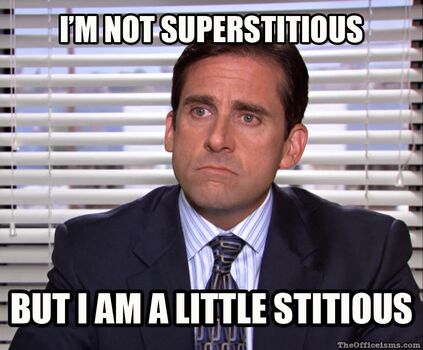 There is a story about my childhood that goes something like this. I am a baby and I am crying without consolation. In modern times, this would be considered colic. In the olden days, my mother was told that I had been given the evil eye. Whether it was done intentionally by a jealous friend, or unintentionally by a passerby that just had la mirada muy fuerte, or a strong gaze, is unbeknownst to me. The solution to my colic, err, evil eye, was to have someone rub an egg all over my body. The idea was that the egg would suck up the evil eye magic that was making me cry. After they had rubbed this salmonella covered egg all over my tiny baby body, they cracked the egg. The yolk was dirty, and so the magic had worked. I was evil eye free! After that my mother was advised to put a bracelet made of gold and red beads on me to prevent this from ever happening again. Who was this person that performed the evil eye ritual, who knows? Was she paid? Most certainly but who knows how much? She must have been the town curandera or bruja, or witch doctor, or whatever you prefer. The point is that my mother believed so wholeheartedly as to put her baby in the hands of this “trusted” stranger? Our lives are filled with so many superstitions. Even today, when we consider ourselves more educated because of the advancements in science and technology, we partake in superstitious rituals "just in case." These rituals are a way to make us feel like we have control over what is often times uncontrollable, like luck, love, and the opinion of others, to name a few. What are some superstitions you grew up with? Do you find that these superstitions are true or provide comfort or a sense of control? Are you passing down these superstitions to your kids? Would love to hear from you! XO, Wendy  In the Latina motherhood system the seven deadly sins are considered especially heinous. In Southern California, the dedicated podcasters who confess these scandalous stories are members of an elite squad known as the Mamá Cita Podcast. These are their stories. But all joking aside, at my son’s school they ask the kids “are you making good choices?” so that they will take a moment before acting. In some of the very dumb situations I have put myself in, I wish I would have had this type of question ingrained in me. I have been a very cautious and conscientious person, but even then, I have definitely committed all of the seven deadly sins, to various degrees of course. I acknowledge that it is only out of sheer luck that I am alive today to share the stories of my questionable decisions with my children. What are some things you’ve done that you hope your kids will never do? Do you have actual regrets about these actions? Will you be open and share your questionable decisions with your kids in the hopes that they will do better? Would love to hear from you! XO, Wendy 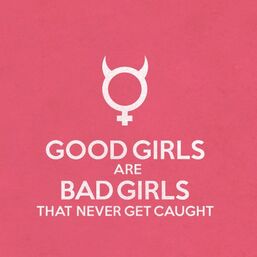 What does this even mean? I guess I have been a good girl because I have been a good person, but I know that the connotation of this phrase is much more weighted. It has the patriarchy written all over it. It is dripping with sexual undertones. It screams cultural gender norms at me. This is not a phrase I ever use with my daughter. It is a phrase I would employ in the presence of a dog and even then, I would prefer to use the dog’s name. I understand how it can be an automatic phrase used when parenting. It is a seemingly simple phrase that kids can understand. But good and bad, boy and girl, black and white are not simplistic opposites. They are very nuanced and complex terms. I am not saying that I know what would be a better alternative. In parenting I am really just trying my best but mostly making it up as I go along. All I know in regards to the phrase “good girl,” or more specifically, “be a good girl,” is that I do not use it. Usually I have written about a topic before we talk about it on the podcast. This episode was improvised. Honestly I do not remember much of what was said except that the reason I never use the “be a good girl” phrase, is because it is confusing. Be a good girl means do not do bad things. Why not just say “don’t do…” fill in the blank? I also never use this phrase because I do not want my daughter to equate actions that are seen as “bad” as descriptions of her character. The action may be bad, but she is not, therefore she does not have to be a "good girl" or be anything really. She can just be herself. In Spanish there is no phrase that is used in parenting that is the exact translation of "be a good girl." We say "portate bien," which translates to "behave well." I definitely use that phrase often, but I don't use it as a threat the way my mother would use it, engaging a stern voice and a severe gaze. Rather, I use it as a friendly reminder. Do you find yourself using the phrase "be a good girl," with your daughter? What are you really trying to say when you use this phrase? Is this something your mother said to you? Would love to hear from you! XO, Wendy 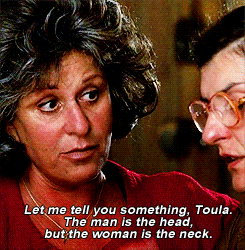 It’s Safe to say Latino culture is male chauvinist oriented and generally revers the machismo persona. There are a lot of factors that come into play. Catholicism which is inherently part of being Latino, proliferates the idea of traditional gender roles as the best way. What does this mean? Women in the home and men at work. But it starts earlier than that. It starts with how we treat our kids and the differences that exist in how we treat boys versus girls. There is a juxtaposition between what culture may dictate and what is really being practiced in the home. For example, I am always reminded of a scene from my big fat Greek wedding where one of the aunts says The man is the head, but the woman is the neck, meaning the woman is the one that navigates which way the head or man is going to move. While Latin culture may adhere to the man as the ruler of the home, it is matriarchal in the sense that the mother figure, usually the grandma is the one that is the most respected in the family and often times consulted on important matters. I hope to become the matriarch in my family. I am thankful that my kids are growing up in an era when the world view is shifting on so many topics specifically those around gender. They will have a world that is much more open to them and I’m looking forward to seeing how they develop as people. They will be able to define themselves as they see fit and hopefully will not be shackled to cultural expectations around gender. In a way and because I am part of two cultures, and grew up straddling both, I grew up in a changing era but also experienced what it is like and what it feels like to be rooted in these traditional gender roles. My big generalization is that in our mother's time there was a stigma associated with not following traditional gender roles. What do gender roles mean to you? What gender stereotypes do you conform to? Which do you challenge? How will you explain gender roles and gender stereotypes to your kids? Would love to hear from you! XO, Wendy  My parents live in my house, down the hall, and did I ever imagine that this is how my life would be as an adult with a husband and a couple of kids? No. Is it hard sometimes? Yes. Would I change it? No. What most would call a “burden” has actually been a beautiful new beginning for my parents and I. I moved out after I graduated from college, but it wasn’t because I found my own apartment and was ready to take on the world as an independent single professional. I left, because my house burned down. It was a cigarette left in the bedroom by my brother’s then crackhead girlfriend. And I’m not being mean, this is literal. She was a crackhead. My parents let her stay and supported her even after she burned down our house and so I never went back home. From the ashes of this tragedy I made my own sense of home, created my own family, and honestly it was a necessary and poetic rebirth for me as a young adult. My relationship with my parents already is distress though became pretty much non-existent. Through the years, we have slowly reconciled our relationship, but there was never a comfortable relationship to begin with so... So why did my parents end up in my house? Well, because that is what family does. Regardless of the circumstances, family helps each other out. And boy have my parents have helped me out. Their presence in my home has allowed me the freedom to work and to date my husband. I have built in babysitting for goodness sake! This is absolutely priceless. My parents are great playmates. They allow me to take a mom break if I need to shower, or just breathe for a second. The grandparent grandchild relationship is beautiful. I did not experience it first-hand but I am so thankful that my kids get to. Is it hard to have my parents around all the time? Of course! No one wants to live with the judging eyes of their old school Latino parents. It’s getting easier. At first I felt like I was teenager again, rebelling and rolling my eyes every time my mom said something, especially regarding parenting. In my head I was always like “like how would you know! You were never there!” So yes, I have definitely had some issues to work through. Not to mention that by having my parents in my home, I am the epitome of the sandwich generation. I take care of them and my kids and I’m sandwiched in between. It ends up feeling like I have four kids. In Like Water for Chocolate- Como Agua Para Chocolate by Laura Esquivel, the main character is the youngest daughter and they talk about how it is her duty as the youngest to never marry and devote her life to taking care of her mother. I’m the youngest. I’m taking care of my mother. I’m totally fulfilling an outdated stereotype that should have never existed because, how horrible is it that you are born just to fulfill this duty? But I’m using it to my advantage. My big generalization is that since the pandemic, more people are going to adopt this very traditional family structure and like it. Would you ever create a multi-generational home on purpose? Do you live in one? What is your experience? Would you recommend it? Are you expected to take care of your parents because you’re the youngest daughter? Would love to hear from you! XO, Wendy |
AuthorWendy writes blog posts that turn into conversations for the Mamá Cita Podcast. Archives
May 2021
Categories
All
|
 RSS Feed
RSS Feed
